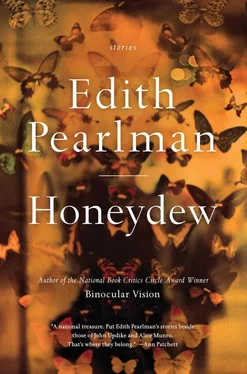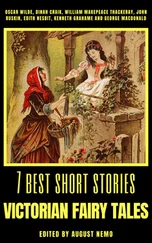For her part, Amanda claimed loftily that she was employing him to guide her through earthly delights. They would emerge from the summer as warm friends, nothing more. After college she intended to embark on an adventurous career. She would live amid palaces, and also dung.
“‘Life is made up of marble and mud,’” he had quoted softly.
“Hawthorne?”
“Hawthorne.”
“Hawthorne was right.”
She was in some ways as green as Frieda. Now he looked across the table at the two sweet faces, Frieda’s still vague under a cloud of hair, Mandy’s excited. Her dancing eyes showed that she considered her new theory to be revealed truth. He knew she would not rest until she had revealed it to others. It had been base of him to suspect her of clever falseness. Oh, her Yankee honesty! And, oh, his Brooklyn suspiciousness. Such a misalliance. And what on earth were the two of them doing here, messing up the Cunninghams’ place and overstimulating the worshipful Frieda? His stomach rumbled, as if in protest.
“What have we for dessert?” he formally inquired.
“For dessert,” Amanda told him, “we have nothing.”
The summer wore on. Amanda went every day to her typist’s job at the offices of Godolphin’s weekly, the Gazette. Then she came home to work on her article, which was going better. Ben taught his two courses at the university, and then came home to work on his article. Frieda continued to hang around their doorways.
“Connubis” got retitled “Mariage de Convenance.” Amanda had conceived of it as an intelligent young woman’s guide to marriage customs past and present. But it was now a manifesto, a call to common sense. “If marriage does not confer an advantage,” she declared one night, “it would not be undertaken. The new woman must not wed for sentimental reasons.”
“I think the dinner is burning,” Frieda said.
Mandy took the pot off the stove and served the baked beans. When they were all eating she continued. “The Roman custom of concubinitas might have demeaned the institution of marriage, but it didn’t demean the participants. However, dignitas, despite its name, was exploitative. The woman was expected to bear children, and she and the children were under the potestas of the male. As for the trustee marriage in the Dark Ages, it is being revived today in the much-touted ‘extended family.’ But the eager beavers who want to restore and strengthen the extended family don’t realize that the trustee system involved blood vengeance, bride purchase, and sometimes bride theft.”
Silence from her companions. Finally Ben said, “Take out eager beavers .”
“What? I was just making conversation.”
“You were quoting nonstop.”
A hand fluttered to her curls. “Oh, was I?”
“These beans are awful,” Frieda said.
United for once, her hosts glared at her.
“I was just making conversation,” Frieda protested. “Listen, tomorrow night I’ll do the cooking.”
Soon she was making their breakfasts as well as their dinners, running up early in the morning to start coffee. Amanda and Ben enjoyed sleeping late. Frieda cleaned up too. Ben liked coming home to a well-kept apartment. Each afternoon he sat down at his dusted typewriter with a vigorous feeling. Worthy pages began to pile up on the table beside the machine. He felt more and more benevolent toward Hawthorne’s first novel. The great author himself had repudiated Fanshawe —had even cast all available copies into the flames — but he, Dr. B. Stewart, would rescue the work, would reveal it as the precursor, however flawed, of the later masterpieces. It was a help on these afternoons to know that there was a bowl of strawberries in the refrigerator, and a pound cake on the counter. Frieda herself was never in the way.
“All daughters should be like you,” Ben said one night.
Frieda flushed. Amanda frowned at him.
“All younger sisters, I mean,” he said, getting the same response. “Silent partners? What do you consider yourself, toots?”
“A helpmeet,” Frieda said.
“Like Phoebe in Seven Gables ?”
“Yes.” She had been doing her homework.
Every Friday the three of them went out for pizza and a movie. Every Tuesday Frieda went off with her aunt to visit another aunt, and Amanda and Ben were left to amuse themselves. They took the girl’s absences with the same good nature as they took her presence. Sometimes they talked about her devotion to them.
“She adores you,” Amanda said.
“She adores you,” Ben returned politely.
“She adores us both. My exuberance. Your scholarly wit. It’s wonderful, being adored. But whatever will Frieda do back on West End Avenue with those two aesthetes her parents?”
“I’ll call her every so often,” Ben said. “I’ll come up from the Village and treat her to a concert. I’ll buy her tea afterward, like an uncle.”
“Where?” Amanda asked.
“At the Palm Court,” said the expansive Ben.
“Will you really do that for Frieda?” Amanda asked unjealously.
It was midnight. They had just made love. Mandy in a long nightshirt sat on the porch glider looking at the moonlit streetscape of three-decker houses, each with its maple tree. Ben kissed her, then stood up with his back to the scene and leaned against the railing. “I don’t know if I’ll really do anything for Frieda.” He yawned. “I can’t look past this moment.”
But that was untrue. He was looking past this moment at this moment. Gazing at the tumbled young woman before him, he could see clearly another version of that young woman, wearing a cap and blazer as befitted a college girl. The maples were yellowing. Amanda waved good-bye. He saw himself, also purposefully clad, headed back to New York and the intense, exophthalmic psychiatric social worker whom destiny no doubt had in store for him. He groaned.
“We’ll always be friends,” Amanda soulfully promised.
It became Ben’s turn to do the dinner-table lectures.
“Hawthorne had a surprisingly gloomy view of life, considering how conventionally domiciled he was. That supportive wife, those devoted children. Yet his point of view remains tragic. Especially in The Marble Faun, with its plot of murder and paganism, its theme of sin and suffering, does he—”
“Supportive wife?” Amanda sniffed. “Sophia Hawthorne was a milksop, if you ask me. Letting him wallow in free love at Brook Farm while she waited celibately in Salem.”
“There is no indication of sexual irregularity in the Brook Farm documents.”
“I can read between the lines.”
“Nathaniel considered himself saved by his marriage.”
“Sophia knew herself ruined.”
“They went off to Italy, didn’t they?” Frieda said. “What a pair of nitwits. Please have some more bouillabaisse.”
Ben considered arguing further but chose the bouillabaisse instead. Mandy’s sassy comments did serve to illuminate the novels, in which placid arrangements within the house were threatened by the turbulence without. Only away from the hearth could the moral order be upset. This seemed particularly true of Fanshawe, which was now revealed to him as a morality tale: domestic continuity triumphing over unregulated passion. Afternoons, sitting in the Cunninghams’ dining room, Ben felt the rightness of his position. In their comfortable place it was possible for him to gaze long and hard at Hawthorne’s devils. Frieda’s lemonade helped too.
The summer was drawing to a close. Late one hot August night, Ben and Amanda sat on the porch drinking wine and watching the stars over the three-deckers. Amanda was on the glider, Ben on a canvas chair.
For a while they were silent. Then: “We’ve been happy here,” Amanda began.
Читать дальше












